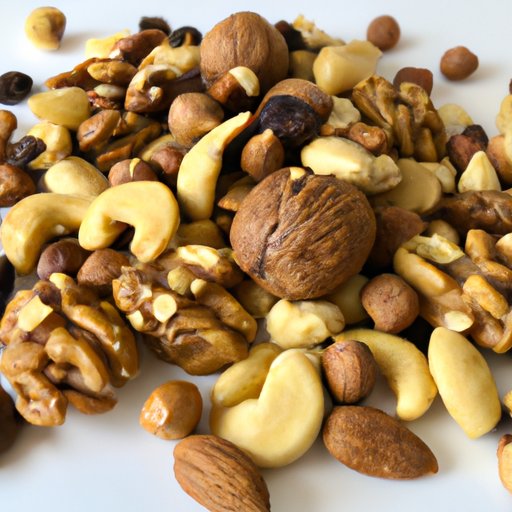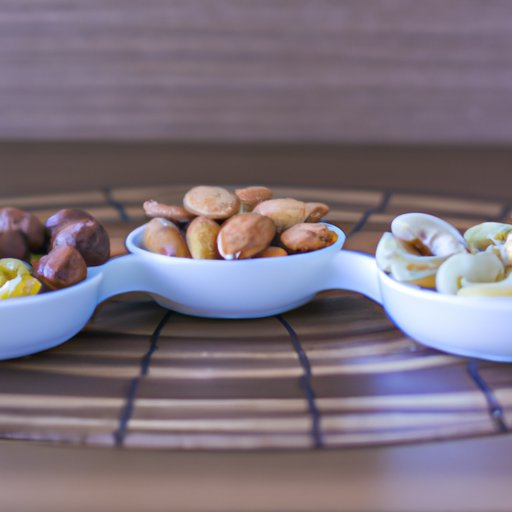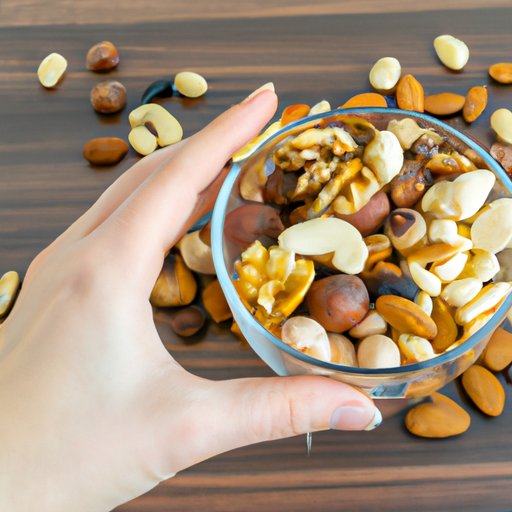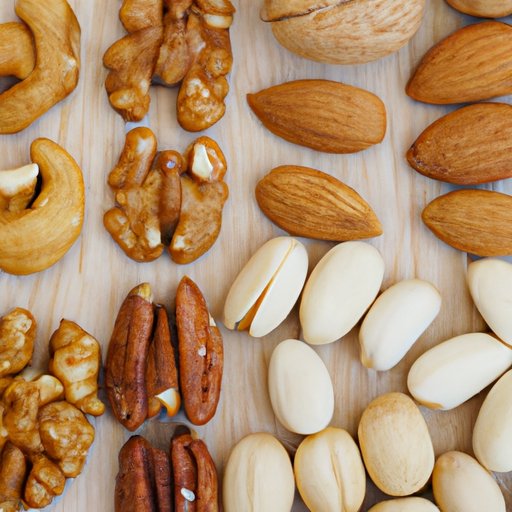Introduction
Nuts are a type of edible seed that can be eaten as a snack or added to meals as a nutritious topping or ingredient. They are packed with essential nutrients and have many health benefits when consumed in moderation. Eating a variety of different types of nuts can help meet your daily nutrient requirements and improve your overall health.
Nuts are rich in healthy fats, protein, vitamins, minerals and antioxidants, making them an important part of any balanced diet. They also provide dietary fiber, which can help promote healthy digestion and reduce cholesterol levels. Nuts can also help to regulate blood sugar levels, boost immunity and reduce inflammation.

A Comprehensive Guide to the Healthiest Nuts to Eat
When it comes to choosing the healthiest nuts to eat, there are a few key factors to consider. Here is a comprehensive guide to the top 10 healthiest nuts, what you need to know about the health benefits of eating nuts, and the pros and cons of different types of nuts.
Top 10 Healthiest Nuts
Here is a list of the top 10 healthiest nuts to include in your diet:
- Almonds
- Cashews
- Walnuts
- Pistachios
- Macadamias
- Pecans
- Hazelnuts
- Brazil Nuts
- Pine Nuts
- Peanuts
What You Need to Know About the Health Benefits of Eating Nuts
Eating nuts can provide a range of health benefits, including:
- Nutrient-dense foods: Nuts are a great source of essential vitamins and minerals, such as magnesium, phosphorus, zinc, copper, manganese and selenium. They are also a good source of healthy fats, protein, carbohydrates, dietary fiber and antioxidants.
- Heart health benefits: Eating nuts can help reduce levels of “bad” cholesterol (LDL) and increase levels of “good” cholesterol (HDL). This can help to reduce the risk of heart disease and stroke.
- Weight management: Eating nuts can help to keep you feeling full for longer, which can help with weight management and reducing cravings for unhealthy snacks.
- Improved digestion: Nuts contain high amounts of dietary fiber, which can help to keep your digestive system running smoothly.
- Brain health: Eating nuts can help to protect against neurodegenerative diseases, such as Alzheimer’s and dementia, due to their high antioxidant content.
- Reduced risk of certain diseases: Eating nuts can help to reduce the risk of certain chronic diseases, such as type 2 diabetes, cancer and cardiovascular disease.

The Pros and Cons of Different Types of Nuts
Different types of nuts have different nutritional profiles and associated health benefits. Here is a breakdown of the pros and cons of some of the most popular types of nuts.
Almonds
Pros: Almonds are rich in healthy fats, protein, vitamin E, calcium and magnesium. They are also a good source of dietary fiber, which can help to lower cholesterol levels and reduce the risk of heart disease.
Cons: Almonds are relatively high in calories, so it is important to consume them in moderation.
Cashews
Pros: Cashews are a good source of healthy fats, protein, vitamins, minerals and antioxidants. They are also low in saturated fat and cholesterol, making them a heart-healthy choice.
Cons: Cashews are relatively high in carbohydrates, so they may not be suitable for those following a low-carb diet.
Walnuts
Pros: Walnuts are rich in omega-3 fatty acids, which can help reduce inflammation and improve heart health. They are also a good source of dietary fiber, protein and vitamins.
Cons: Walnuts are relatively high in calories, so it is important to consume them in moderation.
Pistachios
Pros: Pistachios are a good source of healthy fats, protein, dietary fiber, vitamins and minerals. They are also low in calories and may help to reduce cholesterol levels.
Cons: Pistachios are relatively high in carbohydrates, so they may not be suitable for those following a low-carb diet.
Macadamias
Pros: Macadamias are a good source of healthy fats, protein, dietary fiber, vitamins and minerals. They are also low in calories and may help to reduce cholesterol levels.
Cons: Macadamias are relatively high in fat, so it is important to consume them in moderation.
Pecans
Pros: Pecans are rich in healthy fats, protein, dietary fiber, vitamins and minerals. They are also low in calories and may help to reduce cholesterol levels.
Cons: Pecans are relatively high in fat, so it is important to consume them in moderation.
Hazelnuts
Pros: Hazelnuts are a good source of healthy fats, protein, dietary fiber, vitamins and minerals. They are also low in calories and may help to reduce cholesterol levels.
Cons: Hazelnuts are relatively high in fat, so it is important to consume them in moderation.
Brazil Nuts
Pros: Brazil nuts are a good source of healthy fats, protein, dietary fiber, vitamins and minerals. They are also high in selenium, which can help to support the immune system.
Cons: Brazil nuts are relatively high in fat, so it is important to consume them in moderation.
Pine Nuts
Pros: Pine nuts are a good source of healthy fats, protein, dietary fiber, vitamins and minerals. They are also low in calories and may help to reduce cholesterol levels.
Cons: Pine nuts are relatively high in fat, so it is important to consume them in moderation.
Peanuts
Pros: Peanuts are a good source of healthy fats, protein, dietary fiber, vitamins and minerals. They are also relatively low in calories and may help to reduce cholesterol levels.
Cons: Peanuts are relatively high in fat, so it is important to consume them in moderation.

How to Choose the Healthiest Nuts for Your Diet
When choosing the healthiest nuts for your diet, here are a few tips to keep in mind:
- Consider dietary needs: If you are following a specific diet, such as a low-carb or paleo diet, it is important to select nuts that are compatible with your dietary needs.
- Look at nutrition labels: Check the nutrition labels on all products to compare the nutrient content of different types of nuts.
- Check for added sugar or salt: Avoid nuts that have added sugar or salt, as these can be unhealthy when consumed in large amounts.
- Buy organic when possible: Organic nuts are free from harmful pesticides and chemicals, making them a healthier option.
A Nutrient Comparison of Different Types of Nuts
Here is a comparison of the nutrient content of some of the most popular types of nuts:
| Nutrient | Almonds | Cashews | Walnuts | Pistachios | Macadamias |
|---|---|---|---|---|---|
| Protein (g) | 6 | 5 | 4 | 6 | 2 |
| Carbohydrates (g) | 14 | 22 | 4 | 13 | 9 |
| Fats (g) | 14 | 16 | 18 | 13 | 76 |
| Vitamins & Minerals | Calcium, Iron, Magnesium, Phosphorus, Potassium, Zinc, Vitamin E | Iron, Magnesium, Phosphorus, Potassium, Zinc, Vitamin E | Calcium, Iron, Magnesium, Phosphorus, Potassium, Zinc | Calcium, Iron, Magnesium, Phosphorus, Potassium, Zinc, Vitamin E | Calcium, Iron, Magnesium, Phosphorus, Potassium, Zinc |
Conclusion
In conclusion, nuts are an important part of any balanced diet. They are packed with essential nutrients and have many health benefits when consumed in moderation. Eating a variety of different types of nuts can help meet your daily nutrient requirements and improve your overall health. When choosing the healthiest nuts for your diet, it is important to consider dietary needs, look at nutrition labels, check for added sugar or salt, and buy organic when possible.
(Note: Is this article not meeting your expectations? Do you have knowledge or insights to share? Unlock new opportunities and expand your reach by joining our authors team. Click Registration to join us and share your expertise with our readers.)
